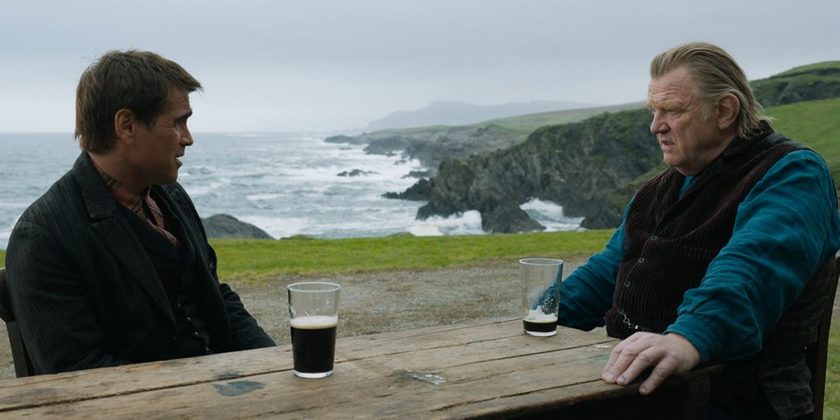I feel I should mention from the start that The Banshees of Inisherin is the most devastating film I’ve seen in recent memory. Perhaps it was due to end-of-year malaise, my frame of mind that day, but I was plunged into a deep depression for the rest of the day. While I’m glad I saw writer/director Martin McDonaugh’s latest, I’m reluctant to revisit it in even memory. Nevertheless, it’s a movie with watching and discussing. It has things to say about the artist’s life, and life in general.
Here there be spoilers.
The premise is laid out in the trailer. Colin Farrell plays Pádraic, a simple farmer who is content to live a simple life on the family farm with his sister (Kerry Condon), caring for his animals (more like pets), far removed from the civil war raging on the mainland. Every afternoon at two o’clock he meets his friend Colm (Brendan Gleeson) at the pub for a pint. Until one day Colm decides that Pádraic is dull and doesn’t want to talk to him anymore.
Now there’s a civil war on the island.
Colm is an artist with a house filled with trinkets from around the world. His horizons are wider than his former friend’s and he’s tired of wasting his time listening to him prattle on about pony shite. A musician, there’s a song he needs to compose so that he can leave behind something that matters. Why he can’t do both isn’t explained, and doesn’t need explanation. It just is.
To prove how serious he is, Colm cuts a finger from his fiddle hand for every time Pádraic bothers him.
People are strange that way, perhaps artists most of all. It’s good characterization and gives the movie a sense of dread. It defines Colm’s goals and sets the stakes. But make no mistake, for all the moments of humor Banshees is a tragedy. By stubbornly holding to his threat, Colm ensures that no one will ever hear his tune. And when Pádraic’s beloved miniature donkey chokes and dies from trying to eat one of the severed fingers, the point is driven home.
In wars, big and small, it’s the innocent who suffer most.
There’s a warning here to artists. By nature, they tend to be dramatic and often self-destructive. Hemingway. Howard. Heck, even Bruce Lee! What has the world lost because artists choose dark paths? Movies like La La Land tell us that relationships must be sacrificed for art. And to be sure, the artist’s life is by necessity a lonely one. Yet when the art becomes everything, when we forget that the community making up our audience matters, the art is meaningless.
We need community, and we need to care about humanity.
It doesn't come from nowhere. A banshee is a harbinger of death. Her scream warns the living that someone, someone precious, maybe you, will die. Like a spectral momento mori, she reminds us that "someday you will die." Many things die. People. Relationships. Dreams. To deny otherwise is foolish. But it wasn't supposed to be that way. We were created to live forever.
Banshees only gives us one side of the coin.
The final point McDonaugh wants to make is “Some things there’s no moving on from. And I think that’s a good thing.” Yes, actions have consequences, some of which are irrevocable. Knowing and accepting that truth is a good thing. But it’s only good if it changes how we live. The fact in and of itself is neither good nor bad. To say otherwise is fatalism. And what of forgiveness? What of redemption?
You’ll find none of that here.
We can hold the course. We can deny reality. We can run away. We can die. Different characters take each of these paths. Unfortunately, the story leaves us with those options and nothing more. Perhaps to have offered another option would have undercut the message. But I think it’s why Banshees leaves so many of us feeling empty, hopeless.
Let me offer a counter message: try to live in peace with everyone and put the needs of others ahead of your own. Forgive as you have been forgiven.

























